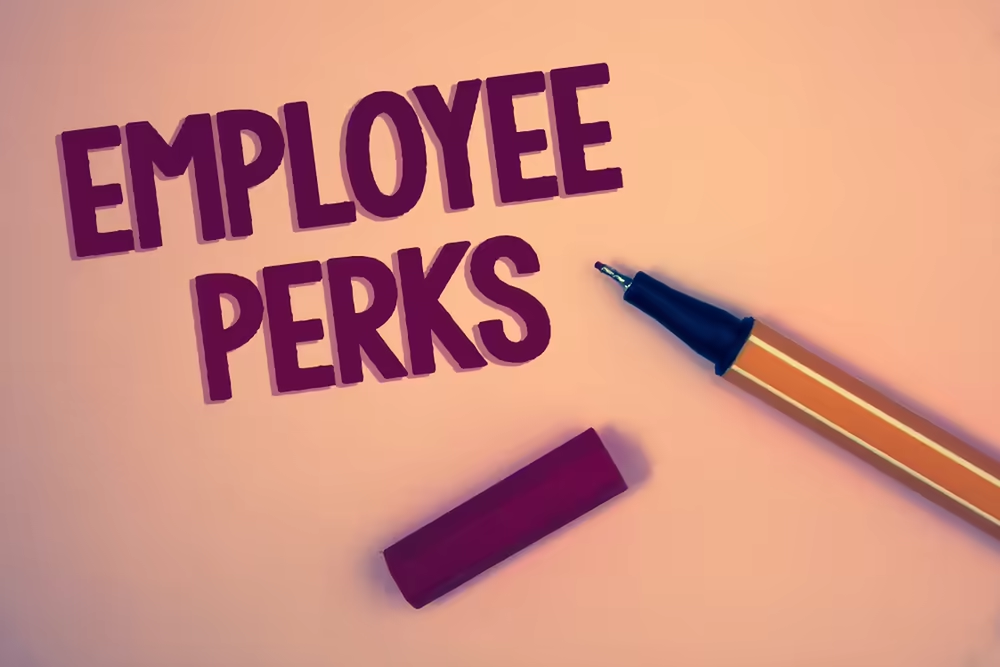Money is no longer the greatest motivator when it comes to looking for a job. Whilst it is true that everyone would love a salary increase a recent industry study reported that 48% of employees would weigh company benefits and perks, including the availability of snacks, in their decision to find their next job. This is also true when working with temporary workers since perks will more than likely determine if they stay after the assignment is done. Employee benefit programs work perks can be a key deciding factor for potential employees who are choosing their next workplace. Unique incentives can help attract strong talent, maintain employee morale, and improve overall satisfaction with the organization.
Based on benefits provided, a 2018 survey by Comparably ranked Facebook number one in Best Companies for Perks & Benefits (large companies in the US), with Salesforce ranked second, followed by Google; Adobe (ranked 14th) and Zillow (ranked 18th) also made the list. Another 2018 survey by Comparably ranked Google (3rd), Salesforce (5th), Facebook (16th), and Adobe (23rd) as having the Happiest Employees in large companies in the US (HubSpot was 1st, followed by Netflix); this ranking is based on employee satisfaction with compensation, benefits, work environment, and employee value.
Top 17 Employee Perks
1. Paid maternal and paternity leave
Employees want to know they can still earn a wage and pursue career goals while caring for a newborn or newly adopted child. Companies that offer paid time off for new parents will likely gain points with top performers who may plan to become a parent — again or for the first time — in the future.
Example: American Express’s parental leave policy offers up to five months of fully-paid leave for both mothers and fathers. Birthing mothers generally receive an additional 6 to 8 weeks under salary continuation for medical leave. Parents are also given access to a 24-hour lactation consultant, and mothers travelling for business can ship their breast milk home for free.
2. Health insurance
After salary, this staple benefit is of the utmost importance to many job candidates and typically includes medical coverage for employees and their families. 40% of respondents to Glassdoor’s Q3 2015 employment confidence survey said that they value health insurance more than a pay raise.
Example: Facebook provides healthcare coverage and free housing for interns. Known for its competitive benefits package, many Facebook interns report earning more than $7,000 per month.
3. Free food!
Some companies go all out, offering every meal, snack and treat for free. You don’t necessarily need to go that far, but catered lunches once a week and quality coffee freely available in every break room can certainly help keep morale high.
Example: Google's food perks don't stop at three free meals a day from their many on-campus restaurants.
4. Employee wellness programs
Research showed that 73% of employers have mental wellness offerings of some sort, such as stress management. And half of them cover the full cost. Financial and physical wellness are also on the radar. Sixty-five percent of employers polled by Glassdoor said they offer financial wellness resources, such as retirement planning or credit counselling. Sixty-three percent said they provide gym access, incentives for engaging in healthy behaviour or other physical wellness options, with 40% of companies paying for it outright.
Example: Reebok encourages employees to reach their personal fitness goals by providing an on-site gym with Crossfit classes. Microsoft offers an annual $800 “StayFit” reimbursement program to help cover the cost of gym memberships and fitness programs.
5. Advancement in Education
As the cost of higher education continues to rise beyond what many people can afford, companies are offering tuition assistance as a perk of employment
Example: Starbucks provides full tuition reimbursement for its employees, covering an online bachelor’s degree program through Arizona State University.
6. Sabbaticals
An increasing number of forward-thinking employers have been making extended work breaks, or sabbaticals, a part of their benefits and company policies.
Example: Deloitte offers two sabbatical programs: an unpaid one-month sabbatical that can be taken for any reason, and a three- to six-month sabbatical that can be taken to pursue personal or professional growth opportunities with 40% pay.
7. Flexible work schedules
The ability to work from home or work varying hours is a close second to paid family leave as the most popular benefit, according to Unum’s survey. According to SHRM, more than two-thirds (70%) of organizations now offer some type of telecommuting, either on a full-time, part-time or ad-hoc basis, up from 62% last year and 59% in 2014. Amazon, UnitedHealth Group, SAP and Aetna are among the employers embracing remote and flexible work arrangements.
Example: Insurance company Swiss Re’s “Own the Way You Work” program encourages employees to embrace flexibility with their schedules and work remotely.
8. Mental health assistance
With the increasing rates of depression and anxiety in this generation, it’s important to know whether your employer has mental health benefits available to you when you need it.
Example: Southwest offers all employees and their dependents access to Clear Skies, an employee assistance program that provides confidential counselling, work/life services, and legal consultations. Considering the long hours and high volume of work that accountants in the private sector face, this “Big Four” accounting firm launched its “r u ok?” program to address mental illness and addiction at EY. The idea is to enhance EY’s culture of caring by reaching out to people who may be struggling and removing the stigma around asking for or accepting support.
9. Financial Planning resources
Unum found that more than a quarter of employees would like to help with their finances from their employer. Financial wellness resources can include training on debt reduction, asset management and saving for current and future needs, such as purchasing a home, financing their children's education or preparing for retirement. About a quarter of organizations offer employees financial/investment advice online, one-on-one or in a group or classroom setting, according to SHRM. In a 2000 study done by Virginia Tech, 75 percent of employees surveyed felt that they were making better financial decisions in the workplace due to the financial planning programs that were sponsored by their employer.
Example: Salesforce offers an Employee Stock Purchase Plan (ESPP) to help its employees.
10. Performance Bonus
The Incentive Research Foundation conducted an analysis of 45 studies on the effects of incentives. The researchers found that incentives have a positive impact on performance
Example: Software company Huddle is an example as it gives employees around $6,000 joining bonus and an annual $600 gift. Interestingly, the performance bonus might not always relate to work performance. CloudApps has implemented a system of ‘green bonuses’, which are rewards given to employees for taking positive environmental actions, such as recycling at work.
11. Retirement plan
Most employees have strong feelings about their retirement benefits. Fora Financial surveyed over 1,000 workers to gauge their retirement benefit perceptions. Here are some survey highlights:
- Workers without employer-sponsored retirement benefits don’t believe they’ll be able to retire comfortably. (Only 32% of this subset feel good about their retirement prospects.)
- Retirement plans double the likelihood that employees will be satisfied with their benefits package.
- 31% of employees who don’t receive retirement benefits from their employers are thinking about switching jobs.
Example: Quartz listed companies that offer defined-benefit pensions plans in 2016, with the list featuring companies such as Johnson & Johnson and Prudential Financial Inc.
12. Stock, Stock Options and/or Equity
Similar to performance bonuses, stock options and equity give employees a real sense of ownership in the success of the business.
Example: yoghurt company Chobani announced it would give all its employees equity awards,
13. Childcare assistance
Both parents work in the majority of households with children. This means that childcare is non-negotiable for millions of workers.
Example: CA Technologies is an example of an employer that has taken this perk seriously. The American software company provides on-site daycare service for company employees’ children.
14. Commuter assistance
All things being equal, an employee will take a job with a short commute over a long one. She might even take money in exchange for a shorter commute. Commuter assistance can go a long way towards improving their quality of life and is therefore a perk that moves the needle when it comes to hiring and retention.
Example: Microsoft is among those well-known companies that have understood the advantage of commuter assistance. The tech-giant offers free bus-services and freecycle tune-ups for those that cycle to work, for example.
15. Supplemental Insurance
Several supplemental insurance programs can be offered at group rates to employees for pennies on the dollar. Things like spousal life insurance, pet insurance, cancer care, and hospital cash plan can be valuable to employees who need this extra level of coverage.
Example: Facebook offers Health/dental/vision insurance: Extremely competitive in both cost of the insurance (per paycheck cost) as well as coverage amounts at the time of care. Life insurance: Basic, spouse/partner, and child life insurance options available.
16. Discount programs
Many employers partner with retailers and service providers to offer discounts to their employees. Common examples include savings on:
- Wireless plans
- Travel needs (hotels, rental cars, airlines, etc.)
- Local attractions
Naturally, companies that sell consumer products or services should consider offering those at a discount to employees
Example: Airbnb gives staff up to $2,000 in travel vouchers – a great way to help employees experience the world and unwind.
17. Personalized day off
Most companies in Tech offer the “work smarter, not harder” policy which allows their employees to take breaks when they feel like it.
Example: Netflix we don’t set a holiday and vacation schedule, so you can observe what’s important to you—including when your mind and body need a break.”
Ultimately, when it comes to keeping employees engaged and satisfied, other factors matter more than a benefits package. According to Glassdoor Economic Research, culture and values, career opportunities and senior leadership are the most important factors leading to employee satisfaction. So while benefits and perks are a great way to get employees in the door, they’re not among the leading factors that keep employees satisfied on the job and with a company long-term. Job seekers often consider a great benefits package to be just as important as salary. Increasingly, benefits like strong health care coverage, retirement and education benefits, and a commitment to wellness and work/life balance are more valuable than ever.

